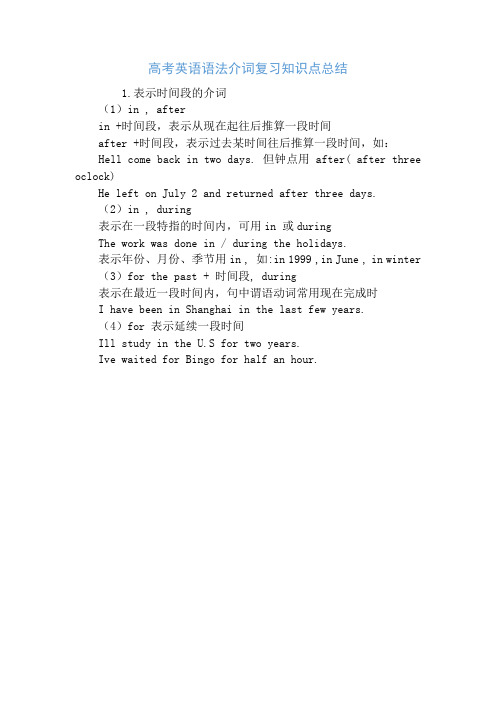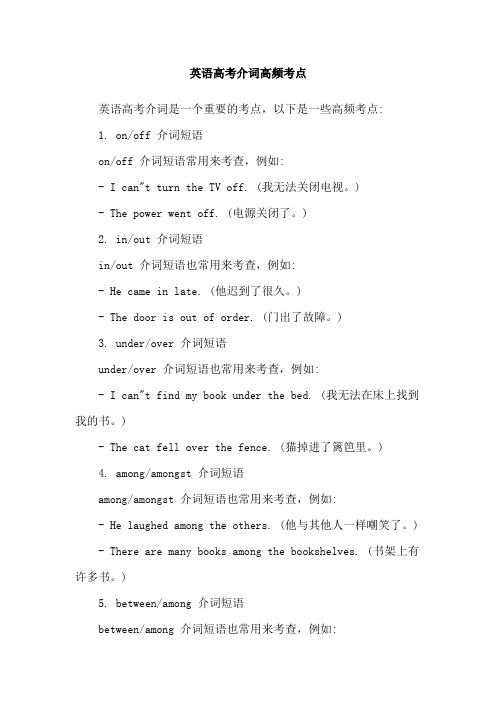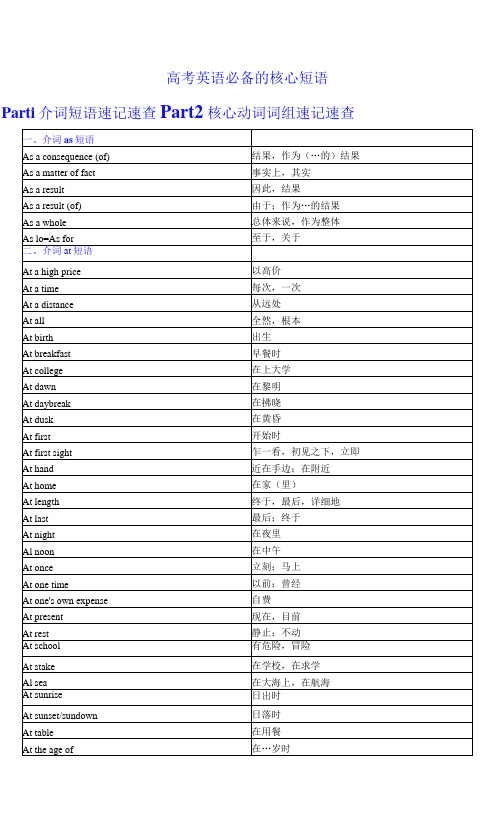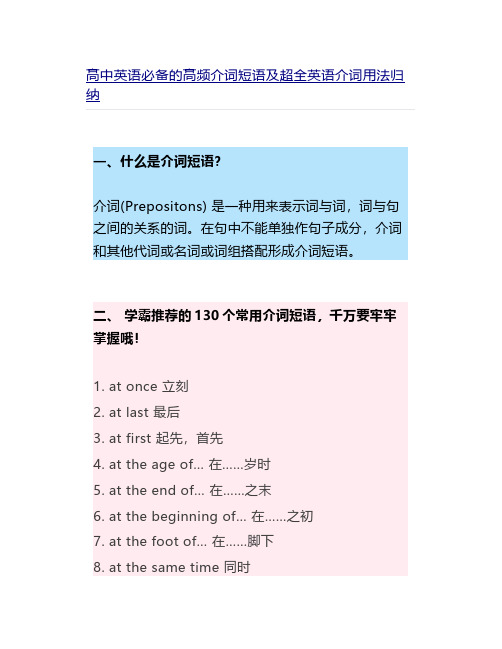高考英语介词短语归纳详解
高考英语语法介词复习知识点总结

高考英语语法介词复习知识点总结
1.表示时间段的介词
(1)in , after
in +时间段,表示从现在起往后推算一段时间
after +时间段,表示过去某时间往后推算一段时间,如:
Hell come back in two days. 但钟点用after( after three oclock)
He left on July 2 and returned after three days.
(2)in , during
表示在一段特指的时间内,可用in 或during
The work was done in / during the holidays.
表示年份、月份、季节用in , 如:in 1999 ,in June , in winter (3)for the past + 时间段, during
表示在最近一段时间内,句中谓语动词常用现在完成时
I have been in Shanghai in the last few years.
(4)for 表示延续一段时间
Ill study in the U.S for two years.
Ive waited for Bingo for half an hour.。
高考英语常用重点介词归纳

5. against against 相反,反对,逆着,靠着
①. against用在fight,strive,struggle等词后 面,同with意思相同,不过against更强调一 种困难中的反抗。 We fight for the weak against the strong. ②. 作为介词,against后接的宾语有时可省略。 He had intended to come but somehow decided against (it).
half after four,five minutes after eight等是美国英语,相当 于英国英语half past four,five minutes past eight等,英国方 言中也有half after four等表达方式;
after引导的状语从句,用现在时态,不用将 来时态。 I shall start after he comes. after常指时间先后的次序,而behind常指位 置,如August comes after July,用after,而 A garden lies behind the house,用behind。 不过有时after和behind可以通用。 Please shut the door after/behind you. He came in after/behind her.
We walked along the road. 我们沿着路走。 The procession passed along the street.游行队 伍沿着街道前进。 You can go straight along this street to the traffic light. 你可以顺着这条街一直走到红绿灯处。 He walked along the mountain ridge. 他顺着山脊走。
英语高考介词高频考点

英语高考介词高频考点英语高考介词是一个重要的考点,以下是一些高频考点:1. on/off 介词短语on/off 介词短语常用来考查,例如:- I can"t turn the TV off. (我无法关闭电视。
)- The power went off. (电源关闭了。
)2. in/out 介词短语in/out 介词短语也常用来考查,例如:- He came in late. (他迟到了很久。
)- The door is out of order. (门出了故障。
)3. under/over 介词短语under/over 介词短语也常用来考查,例如:- I can"t find my book under the bed. (我无法在床上找到我的书。
)- The cat fell over the fence. (猫掉进了篱笆里。
)4. among/amongst 介词短语among/amongst 介词短语也常用来考查,例如:- He laughed among the others. (他与其他人一样嘲笑了。
) - There are many books among the bookshelves. (书架上有许多书。
)5. between/among 介词短语between/among 介词短语也常用来考查,例如:- I can"t find my keys between the sofa and the wall. (我无法在沙发和墙上找到我的钥匙。
)- The children played happily among the flowers. (孩子们在花丛中玩得很开心。
)这些介词短语在英语高考中常常会出现,考生需要熟练掌握它们的含义和用法,以便在考试中更好地应对。
2023高中英语重点短语归纳总结(高考复习必背)

carry back拿|口|,运I可,使想起
carry ...into effect /practice执行,实行,实现,完成
carry off带走叼走,夺去…的生命,获得(奖品)
carry on坚持,继续,进行
carryout贯彻,执行,实施,完成
carry through坚持到底,进行到底,贯彻,完成
call off取消,下令停止call on拜访(某人),号召call out大声喊,唤起call to mind使想起,回忆起call up打电话给…,召集,使想起pay a call at sp.访问(某地pay a call on sb.拜访(某人)
7.以carry为中心的词组
carry about随身携带
a cut above胜过一筹
a short cut近路,捷径
cut a /the record创造新记录,打破记录
cut away切去,砍掉,逃走
cut down砍倒,削减,缩短
cut in half/into halves把...切成两半
cut in /into/to pieces把…切碎
culoff切断,中断,剪下,关掠
break one's promise失言
break ofT打断,断绝,折断,突然终止
break open破开,撬开
break short中断,折断
break through突破,克服,挤过去
break up vt.开垦,破碎:解散,分解vi.结束
4.以build为中心的词组
build ... into把…建设成,把…装入
come into operation开始运转,实施,生效come into possession of占有,拥有
高考英语 介词及介词短语

near 表示相对的“近”,实际距离可能还很远。如: The small child was afraid to go near the dog. 那小孩子不敢靠近那条狗。 by 和 beside 都表示“靠近”,实际距离可能不是很 近,beside 比by更具体表示“在……旁边”。如: She was standing beside her mother. 她正站在她母亲旁边。
27
but 表示排除,多与 nobody, none, no one, nothing, anything, everyone, all, who 等连用,其后可以接不定式;
except for 表示“只是,只不过”,常在说明基本情况 后,从细节上加以修正。except for 的宾语在句中无同类语;
apart from 表示“此外,除……之外”,相当于 besides, as well as; 表示“撇开……来说,除掉”,相当于 except for;
28
in addition to 表示“除……之外还有……”,相当于 besides。如:
Apart from going shopping, the old lady likes walking after dinner except when it rains.
9
(2)on 表示具体的某一天及其早、中、晚。如: on May 1st, on Monday, on a cold night in January, on a fine morning 等。 (3)at 表示在一个时间点上。指某一时刻或较短暂的时 间,也泛指圣诞节,复活节等。如: at 3:20, at this time of year, at Christmas, at night, at this moment 等。
高中英语必备的高频介词短语及超全英语介词用法归纳

高中英语必备的高频介词短语及超全英语介词用法归纳一、什么是介词短语?介词(Prepositons) 是一种用来表示词与词,词与句之间的关系的词。
在句中不能单独作句子成分,介词和其他代词或名词或词组搭配形成介词短语。
二、 学霸推荐的130个常用介词短语,千万要牢牢掌握哦!1. at once 立刻2. at last 最后3. at first 起先,首先4. at the age of… 在……岁时5. at the end of… 在……之末6. at the beginning of… 在……之初7. at the foot of… 在……脚下8. at the same time 同时9. at night/noon 在夜里/中午10. with one s help 在某人的帮助下11. with the help of… 在……的帮助下12. with a smile 面带笑容13. with one s own eyes 亲眼看见14. after a while 过了一会儿15. from now on 从现在起16. from then on 从那时起17. for example 例如18. far away from 远离19. from morning till night 从早到晚20. by bike/air/train/bus 骑自行车/乘飞机/火车/汽车21. by ordinary mail 寄平信22. by the way 顺便说23. by the window 在窗边24. by the end of… 到……底为止25. little by little 逐渐地26. in all 总共27. in fact 事实上28. in one s twenties 在某人二十几岁时29. in a hurry 匆忙30. in the middle of 在……中间31. in no time (in a minute) 立刻,很快32. in time 及时33. on time 准时34. in public 公开地35. in order to 为了……36. in front of 在……前面37. in the sun 在阳光下38. in the end 最后39. in surprise 惊奇地40. in turn 依次41. of course 当然42. a bit (of) 有一点儿43. a lot of 许多44. a little 一点儿45. on one s way to 某人在去……的路上46. on foot 步行47. a talk on space 一个关于太空的报告48. at/on the weekend 在周末49. on the left (right) 在左(右)边50. on the other side of 在……另一边51. on the radio 通过收音机(无线电广播)52. to one s joy 使……高兴的是53. in bed 卧床54. in life 一生中55. by bus 乘公共汽车56. at home 在家57. in English 用英语58. in the middle 在中间59. in a hurry 匆忙,急忙60. in a minute 一会儿61. by the way 顺便说说/问问62. at the meeting 在会上63. in the sun 在阳光下64. at all 压根儿65. at dinner 在吃正餐66. at the table 在桌子旁67. at work 在工作68. at school 在学校69. at the back of 在……后面70. at the end of 在……结尾71. by hand 亲手72. day by day 日复一日73. one by one 一个接一个74. by spaceship 乘坐宇宙飞船75. in a low voice 大声地76. in a word 总而言之,一句话77. in trouble 处于困境78. in fact 事实上79. in the street 在街上80. in order 按顺序,整齐,正常81. in order to 为了,以便82. in the day 在白天83. in line 成一直线84. in a short while 不久85. in all 总共,总计86. in town 在城里87. in silence 不作声88. out of breath 上气不接下气89. out of sight 消失,看不见90. on duty 值日91. on the left/right 在左/右边92. on the one hand;on the other hand 一方面……;(但是)另一方面......93. on top of 在……顶部94. in the distance 在远处95. out of work 失业96. to this day 直到今天97. at table 在进餐98. at desk 在读书或做作业99. at school 在校上学(指学生)100. at the school 在学校101. at sea 在航海中102. at the sea 在海边103. by day 白天104. by the day 按日105. in class 在上课106. in the class 在这个班107. in bed 卧床,在睡觉108. in the bed 在床上109. in prison 坐牢110. in the prison 在监狱111. in red 穿着红色的衣服112. in the red 负债,亏损113. in hospital 住院(指病人)114. in the hospital(因事)在医院115. in office 在办公,执政116. in the office 在办公室117. in secret 秘密,私下118. in the secret 参入秘密,参入阴谋119. in place of 代替120. in the place of 在……地方121. in case of 万一,以防122. of age 成年人123. of an age 同龄人124. out of office 离职125. out of the office 离开办公室126. out of prison(因犯罪)出狱127. out of the prison(因事)从监狱出来128. out of q uestion 毫无疑问129. out of the q uestion 不可能130. at(the)most 至多常用介词基本用法辨析1. in 表示在某地范围之内。
高考英语 代词、介词和介词短语词(解析版)
代词、介词和介词短语考点01 代词1.(2024年浙江卷1月·语法填空)Who knows, perhaps some of the more forward-looking ________ (one) may yet come out with a whole range of “just for you” pack sizes with special offers as well.【答案】ones【解析】考查代词。
句意:谁知道呢,也许一些更有远见的人可能还会推出一系列“只为你”的包装尺寸,并提供特别优惠。
代词one意为“一个人”,在some of后应用复数形式。
故填ones。
preserved for all people of the nation to enjoy-as a national park.【答案】its【解析】考查代词。
句意:这个地方,以其独特而令人惊叹的自然美景,必须被妥善保存供全国人民欣赏。
这里“它们”用形容词性物主代词做定语修饰名词beauty。
3.(2023年全国甲卷改错)In that class, Miss Zhao, our biology teacher, showed we insects on stamps.【答案】we→us【解析】考查代词。
句意:在那节课上,我们的生物老师赵老师给我们看了邮票上的昆虫。
作动词show的宾语,应用宾格us。
故we改为us。
4.(2023年全国乙卷改错)Last Friday my mom decided to color his hair. She studied with all the hair products at the drugstore.【答案】his → her【解析】考查代词。
句意:上周五,我妈妈决定染头发。
此处指“我妈妈染她的头发”,应用代词her。
故his 改为her。
5.(2022年北京卷语法填空)Since people can’t always eat out or cook for ________ (they), they get takeout or order delivery.【答案】themselves【解析】考查反身代词。
高中英语知识点归纳介词短语
高中英语知识点归纳介词短语介词短语在高中英语学习中扮演着重要的角色。
它们在句子中起到修饰名词、动词或形容词的作用,帮助我们更准确地表达意思。
掌握常用的介词短语,对于理解和运用英语具有至关重要的意义。
本文将对高中英语中常见的介词短语进行归纳。
一、表示时间的介词短语1. in the morning/afternoon/evening:在早上/下午/晚上例如:I usually go jogging in the morning.2. on Monday/Tuesday...:在星期一/二...例如:We have a meeting on Monday.3. at the weekend:在周末例如:I always go shopping at the weekend.4. from...to...:从...到...例如:The library is open from 9am to 5pm.5. during the summer/winter/spring/autumn:在夏天/冬天/春天/秋天例如:I like swimming during the summer.二、表示地点的介词短语1. at school/home/work:在学校/家/工作例如:I study English at school.2. in the park/forest/restaurant:在公园/森林/餐厅例如:We had a picnic in the park last weekend.3. on the street/corner:在街上/拐角处例如:You can find a café on the corner.4. at the bus stop/train station/airport:在公交车站/火车站/机场例如:I will meet you at the airport.5. by the river/sea/lake:在河边/海边/湖边例如:Let's have a picnic by the lake.三、表示方式的介词短语1. by car/bus/train:乘坐汽车/公交车/火车例如:I usually go to work by bus.2. on foot:步行例如:The supermarket is just a few minutes' walk away. I usually go there on foot.3. with a smile/tears:带着微笑/眼泪例如:She accepted the award with a smile on her face.4. in a hurry/rush:匆忙地例如:I left the house in a hurry and forgot my umbrella.5. by oneself:独自地例如:He likes to travel by himself.四、表示原因的介词短语1. because of:因为例如:We couldn't go to the party because of the bad weather.2. due to:由于例如:The delay was due to the heavy traffic.3. thanks to:多亏了例如:Thanks to your help, we finished the project on time.4. as a result of:由于...的结果例如:As a result of their hard work, they won the competition.5. in order to:为了例如:He studied hard in order to pass the exam.五、表示目的的介词短语1. for the purpose of:为了...的目的例如:We organized a meeting for the purpose of discussing the new project.2. with the aim of:以...为目标例如:He started exercising with the aim of becoming healthier.3. in order to:为了例如:She saved money in order to buy a new car.4. so as to:以便例如:I woke up early so as to catch the first train.5. with a view to:考虑到例如:They made some changes with a view to improving the product.本文简要介绍了高中英语中常见的介词短语,旨在帮助学生提高对英语的理解和应用能力。
高考英语常考介词短语及其搭配清单
常考介词短语及其搭配清单与名词搭配(1)介词+名词①at a time 每次;逐一;依次at all times 无论何时,一直at times 有时at any time 在任何时候at a loss 困惑,不知所措at birth 出生时at first sight 乍一看,初看起来at hand 近在手边;即将来临at length 终于,最后;详尽地at leisure/ease 悠闲;从容at no time 从不,在任何时候都不at once立刻,马上at one time一度,曾经at present 现在,目前at random 随机地,任意地at the moment 此刻at the latest 最迟at war 交战at will 随意地②beyond comparison 无与伦比beyond comprehension 无法理解beyond description 无法形容beyond(one’s)expectations 出乎意料beyond imagination 超乎想象beyond measure 非常,极其beyond question 毫无疑问beyond repair 无法修理③by accident/chance/coincidence 偶然by design 故意地by heart 单凭记忆by hand 用手工by mistake 错误地by weight 按重量④for a moment 一会儿for life终生for good 永远for certain/sure确定,肯定⑤from+n.from time to time 间或,时常,有时from place to place 到处from top to bottom 彻底⑥in +n.in advance 提前in a sense 从某种意义上说in a way 在某种程度上in(actual)fact 事实上in case 以防万一in debt负债,欠账in detail 详细地in brief简言之;简要地in general一般,大体上in force 已生效,在实施中;大量,众多in effect 实际上;有效in no time立刻,马上in no way 决不in particular 尤其in person 亲自,本人in place 在适当的位置;准备就绪in practice 在实践中;实际上in reality 事实上,实际上in return 作为回报;作为回应in ruins 成为废墟;(生活、国家经济等)崩溃,垮掉in short 总之,总而言之in sight 看得见;可能即将发生in space 在太空in stock 有存货的;有现货的in tears 流着泪,含着泪,哭着in the end 最后,终于in the long run 从长远来看in secret 秘密地in time 及时;迟早in total 总共in vain 徒劳,无结果in turn 依次,轮流;转而,反过来⑦on earth 在地球上;在世界上;究竟,到底on end 连续地;竖立着on fire着火,失火on hand 现有的;在手头,在近旁on holiday 在度假/休假on time 准时on no account 决不on display/show 陈列on principle 根据原则on purpose 故意地on average 平均;按平均数计算on the contrary 正相反on the whole 总的来说⑧out of balance 失去平衡out of breath 上气不接下气out of control 失去控制out of curiosity 出于好奇out of date 过时的out of danger 脱险out of debt 不欠债,还清债务out of fashion 不流行的;过时的out of work 失业out of order 出故障;违反规程out of place 不适当out of patience 不耐烦out of question 毫无疑问out of the question 不可能out of shape 变形;身体状况不佳out of sight 看不见out of trouble 摆脱麻烦⑨to+n.to one’s astonishment 令某人吃惊的是to one’s delight/joy 令某人高兴的是to one’s surprise 令某人惊奇的是to the point 中肯;扼要;切题⑩under+n.under construction 在建设中under pressure 在压力下(2)名词+介词thanks to 由于;幸亏attention to 对······的注意desire for 对·····的渴望devotion to 对·····的忠诚effect/influence on 对······的影响interest in 对······的兴趣masses of 大量的objection to 反对reason for·····的原因similarity to与······类似sympathy for 对······的同情(3)介词+名词+介词①at the age of 在······岁时at the beginning of 在······之初at the cost of 以······为代价at the end of 在······的尽头at the foot of 在······底部at the mercy of 任由······的摆布at the point of 就要······之时at the price of 以······的价格at the risk of 冒着······的危险at the sight of 一看到at the sound of 一听到②in +n. + prep.in addition to 除······之外(还)in advance of(时间上)在······前面in agreement with 与······一致in case of 万一;假使in charge of 负责in comparison with 与······相比in control of 控制in command of 控制;指挥in consequence of 因为(某事)in favor of 支持in connection with 与····相连;与····有关in contact with 与······有联系in contrast to 与······形成对照in exchange for 作为······的交换in relation to 关于;涉及in front of 在······前面in harmony with 与······协调in line with 与······一致in honor of 向······致敬in memory of 为了纪念in need of 需要in place of 代替in praise of 表扬in possession of 拥有in preference to 优先于in preparation for 为······做准备in support of 支持in regard to 关于in respect of 关于in reply to 答复in response to 对······作出反应in(the)light of 鉴于in spite of 尽管in search of 寻找in the face of 面对in the form of 以······的形式in the shape of 以······的形式;呈······的形状in the name of 以······的名义in view of 考虑到③ for fear of 唯恐,生怕for lack of 因缺乏for the benefit of 为了······的好处④with an eye to 着眼于with reference/regard/respect to 关于with the purpose of 以······为目的⑤on account of 由于on behalf of 代表⑥by means of 借助;依靠by way of 蠡杰(be)of help to 对······有帮助pass on 转交;递给rely on 依靠try on 试穿(7)v.+inbreak in 闯入(行窃);插话call in 召来;顺道拜访cut in 插话;强行超车drop in 顺道拜访join in 参加hand in 上交result in 导致persist in 坚持succeed in 在······方面取得成功burst into 突然爆发;突然······起来run into 偶遇crash into 撞上look into 调查agree to 同意attend to 处理,料理;接待(顾客)see to 处理;照料lead to 导致;通向get to 到达object to 反对point to 指向appeal to 吸引;呼吁reply to 答复(10)v.+offbreak off 中断;停顿call off取消;停止进行give off 释放;放出(光、热等)pay off 还清;成功show off 炫耀;卖弄set off 引起;动身take off脱去;(飞机)起飞;开始走红(11)break down 垮掉;分解;出故障calm down(使)平静;(使)镇定knock down 撞倒;拆掉put down 写下;记下;镇压(12)carry out 实行;进行figure out 弄懂;理解give out发出(热、光等);分发;用光run out 用完;耗尽(13)v.+upadd up 把······加起来break up 结束;终止;分解;(关系)破裂bring up 提出;抚养;养育;吐出end up 最终处于give up放弃;中止;戒除set up 开办;创立;安排put up 建立;张贴;抬高agree with 同意;和······一致begin with 以······开始do with 对待;处置combine with 与······结合与形容词搭配(1)adj.+ofbe ashamed of 对·····感到羞愧be aware of 意识到be convinced of 确信be fond of 喜欢be tired of 厌倦be proud of 以······为荣be short of 缺少be sick of 厌烦(2)adj.+withbe connected with 与······有关be content with 对······满意be patient with 对······有耐心be familiar with 熟悉;通晓be generous with 在······方面很大方be pleased with 对······感到满意be popular with 受······欢迎be satisfied with 对······满意be strict with 对······严格(3)adj.+tobe addicted to 对······上瘾;沉溺于be available to sb./for sth.可供某人使用/对某物可用be beneficial to 对······有益处be accustomed to 习惯于be devoted to 致力于,献身于be equal to 相当于;胜任be familiar to 为······所熟悉be vital to 对······极其重要be grateful to 对······感激be harmful to 对······有害be similar to 与······相似be polite to 对······有礼貌(4)adj.+inbe active in 在······方面活跃be rich in 富含······的be successful in 在······方面成功be weak in 在······方面薄弱(5)adj.+forbe eager for 渴望be fit for 适于be responsible for 对······负责be impatient for 对······迫不及待(6)adj.+其他介词be absent from 不在场,缺席be anxious about/for 忧虑,担心be different from 与······不同be curious about 对······好奇be crazy about 热衷于,着迷于be delighted with/at/by因······高兴be enthusiastic about 热衷于be particular about/over 对······挑剔/讲究be optimistic about 对······乐观be skilled at/in 善于be confident about/of 对······有信心其他搭配according to 根据after all毕竟,终究。
高中英语知识点归纳介词短语的复合用法与考点
高中英语知识点归纳介词短语的复合用法与考点介词短语是英语中常见的一种语法结构,它由一个介词和其后的宾语组成。
在英语学习的过程中,学生们需要掌握介词短语的基本用法和常见考点。
本文将对介词短语的复合用法和相关考点进行归纳总结,以帮助大家提高英语学习的效果。
一、复合介词短语的构成与用法复合介词短语由两个或更多的介词组合而成,用于表示更加具体、精确的关系。
以下是几种常见的复合介词短语及其用法:1. On behalf of 代表用法:用于表示代表某人或组织的意思,常用于正式场合或商务信函中。
示例:I am writing this letter on behalf of our company to express our sincere gratitude.2. In favor of 支持;有利于用法:表示支持或对某事有利,常用于讨论某个决定、观点或政策时。
示例:The results of the survey are strongly in favor of implementing the new policy.3. By means of 借助;通过用法:表示通过某种方法或手段来达成某事。
示例:We were able to solve the problem by means of careful analysis and teamwork.4. In addition to 除...之外;除了...用法:表示除了某个人或事物之外还有其他的人或事物。
示例:In addition to English, she can also speak French, Spanish, and German.5. With regard to 关于用法:用于引出讨论或叙述某个问题或主题。
示例:With regard to the recent controversy, the company issued a statement clarifying its position.以上是常见的一些复合介词短语,它们在表达意思时能够更加准确地描述语境和内容。
- 1、下载文档前请自行甄别文档内容的完整性,平台不提供额外的编辑、内容补充、找答案等附加服务。
- 2、"仅部分预览"的文档,不可在线预览部分如存在完整性等问题,可反馈申请退款(可完整预览的文档不适用该条件!)。
- 3、如文档侵犯您的权益,请联系客服反馈,我们会尽快为您处理(人工客服工作时间:9:00-18:30)。
高考英语介词短语归纳详解介词还可按其词义分为下列常见的几种:(1)表地点(包括动向),如about,above,across,after,along,among,around,at,before,behind,below,beneath,beside,between,beyond,by,down,from,in,into,near,off,on,over,through,throughout,to,towards,under,up,upon,with,within,without等。
[注]有不少表地点的介词可表动向,除很明显的across,around,over,towards,near外,还有among,behind,beneath,between,on,to,under等。
(2)表时间,如about,after,around,as,at,before,behind,between,by,during,for,from,in,into,of,on,over,past,since,through,throughout,till(until),to,towards,within等。
(3)表除去,如besides,but,except等。
(4)表比较,如as,like,above,over等。
(5)表反对,如against,with等。
(6)表原因、目的,如for,with,from等。
(7)表结果,如to,with,without等。
(8)表手段、方式,如by,in,with等。
(9)表所属,如of,with等。
(10)表条件,如on,without, considering 等。
(11)表让步,如despite,in spite of等。
(12)表关于,如about,concerning, regarding ,with regard to,as for,as to等。
(13)表对于,如to,for,over,at,with等。
(14)表根据,如on,according to等。
(15)表其他,如for(赞成),without(没有)等。
(一)介词的句法功能介词不能独立在句中做成份,介词后必须与名词、代词、或动名词构成介词短语在句中充当一个成份,表示人、物、事件等与其它人、物、事件等之间的关系。
1、作定语:The book on the table is mine.2、作状语:We have breakfast at seven.(表时间);They were late for meeting because of the heavy rain.(表原因);They started the machine by pressing the button.(表方法)3、作表语:My dictionary 中学is in the bag.4、作宾语补足语:I found him in the office.(二)主要介词区别介词at, in, on的区别1. 表示时间,注意以下用法:(1) 表示时间的某一点、某一时刻或年龄等用at。
如:I get up at six in the morning. 我早上六点钟起床。
He got married at the age of 25. 他25 岁结婚。
(2) 泛指一般意义的上午、下午或晚上以及月或年等较长的时间,一般用in。
如:We watch TV in the evening. 我们晚上看电视。
He went to Japan in 1946. 他于1946 去了日本。
(3) 若表示星期几或某一特定的日期,则用on。
如:He left here on the fifth of May. 他于5 月5 日离开这儿。
in和during表一段时间内两词可互用。
如:in the night,during the night,in the war,during the war。
但略有区别:当接表示“活动”的抽象名词时多用during,接“活动”的动名词及短语时用in。
如:during the discussion/in discussing the problem during her stay in Hubei/in playing basketball/during the course of/in digging the tunnel2. 表示地点、场所、位置等,注意以下用法:(1) 表示某一点位置,用at。
如:We live at No 87 Beijing Road. 我们住在北京路87 号。
The hospital is at the end of the street. 医院在这条街的尽头。
与名词所有格连用表示地点,也用at。
如:at m y sister’s 在我姐姐家at the doctor’s 在医务室(2) 表示空间或范围,用in。
如:What’s in the box? 这盒子里有什么?He lives in Paris with his wife. 他同他妻子住在巴黎。
但有时两者可换用。
如:The meeting was held at [in] the hotel. 会议在宾馆举行。
(3) at 与in 的另一个区别是:at 用于指较小的地方,而in 用于指较大的地方。
如:in Shanghai 在上海at the station 在车站但是,大与小是相对的,有时随着说话者的着眼点不同,大地方也可能用at(比如把一个大地方看作一个点时)。
如:Our plane refuelled at London. 我们的飞机在伦敦加油。
We stopped for an hour at Moscow on our way to Paris. 我们在去巴黎的途中在莫斯科停了1 个小时。
附:表示地理位置的in, on, to:in表示在某范围内,on指与什么毗邻,to指在某环境范围之外。
如:Changchun is in the northeast of China./ Mongolia is on the north of China./ Japan is to the east of China.(4) 介词on 用于地点,主要指在某物的表面。
如:What’s on the table? 桌上有什么?There’s a wallet lying on the ground. 地上有个钱包。
注:在少数搭配中,也用介词on。
如:He works on a farm. 他在农场工作。
3. 在某些搭配中,三者的区别与英国英语和美国英语有关:in the street (英) / on the street (美) 在街上in the road (英) / on the road (美) 在路上in the team (英) / on the team (美) 在这个队at the weekend (英) / on the weekend (美) 在周末at weekends (英) / on weekends (美) 在周末4. 有时三者的差别与搭配习惯和用法有关:in bed / on the bed 在床上(from )in the tree (多指树外之物) / on the tree (多指树本身之物) 在树上2、表示时间的since和from:since表示从过去到现在的一段时间的过程,常与现在完成时连用。
from表示从时间的某一点开始,不涉及与现在的关系。
一般多与现在时、过去时、将来时连用。
如:I hope to do morning exercises from today./ We have not seen each other since 1995.3、表示时间的in和after:1. 均可与一段时间连用,表示“在……之后”,但after 表示以过去时间为起点的一段时间以后,即在(某一具体时间点之后),因此通常与过去时连用;而in 则表示从现在算起的一段时间以后,即在(某一具体时间点之后)因此通常用于将来时或含有将来意义的句子。
如:He came back after three days. 3 天后他回来了。
I’ll come back in three days. 我3 天后回来。
I think he can come back in three days. 我想他3 天后可以回来。
2. after 除与一段时间连用外,还可与一点时间连用,此时可用于将来时(注:in 不能与一点时间连用)。
如:He will arrive after five o’clock. 他5 点钟以后到。
3. after 可以与某些表示活动的名词连用,表示“在……之后”(注:in 不能这样用)。
如:after school 放学后after the meeting 散会后after liberation 解放后after one’s graduation 毕业后附:Behind与After的区别:两者均可表示“在……之后”,其区别是:1. after 主要用于时间或次序,behind 主要用于位置。
如:He decided to leave after lunch. 他决定午饭后离开。
Summer comes after spring. 春去夏来。
The hospital is behind the post office. 医院在邮局后面。
注:behind 有时也用于时间,表示“迟于”,主要用于behind time(迟,晚)这一习语。
如:The train was 20 minutes behind time. 火车晚点20 分钟。
2. 两者都可用于引申义,after 侧重指追求、寻找、模仿等;而behind 则侧重指在背后、支持、落后等。
如:The police are after her. 警察在追捕她。
Many young people are after her. 许多年青人都追求她。
We are behind you completely. 我们完全支持你。
He is behind the others in maths. 他的数学不如别人。
5、表示“在……上”的on和in:on只表示在某物的表面上,而用in表示占去某物一部分。
如:There is a book on the piece of paper./ There is an interesting article in the newspaper./ He duga hole in the wall.6、表示“穿过……”的through和across:through表示从内部通过,与in 有关;across则表示从一端至另一端在表面上的通过,与on有关。
